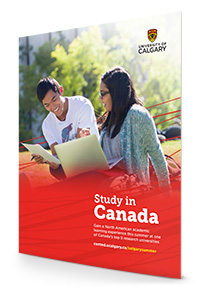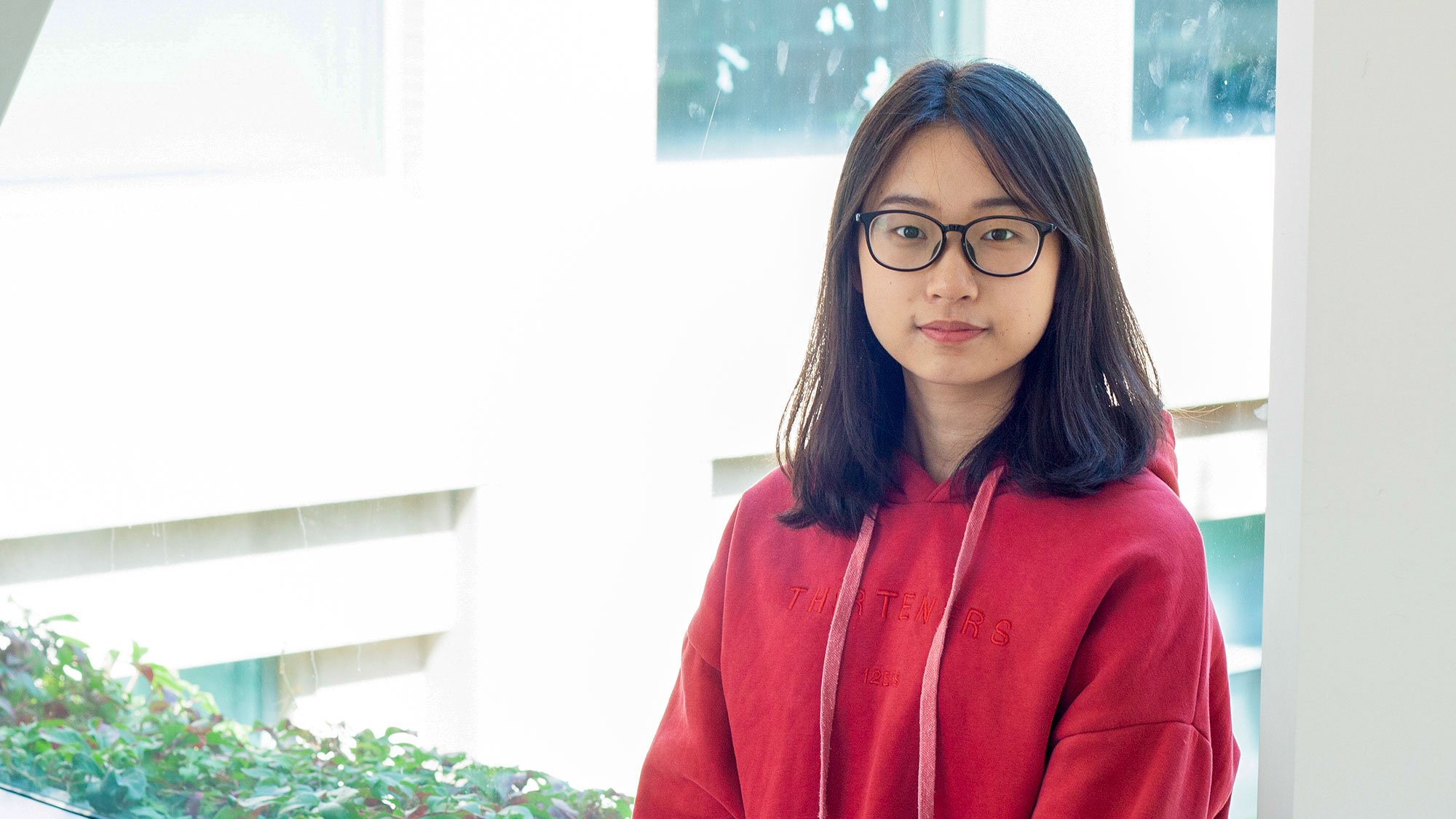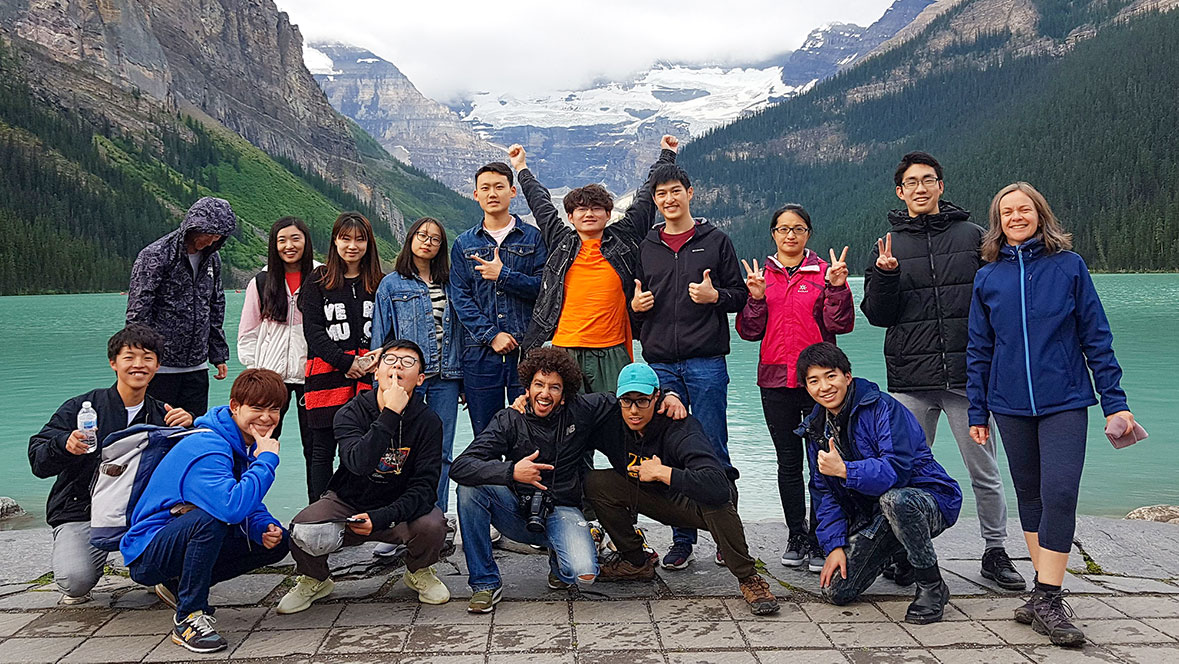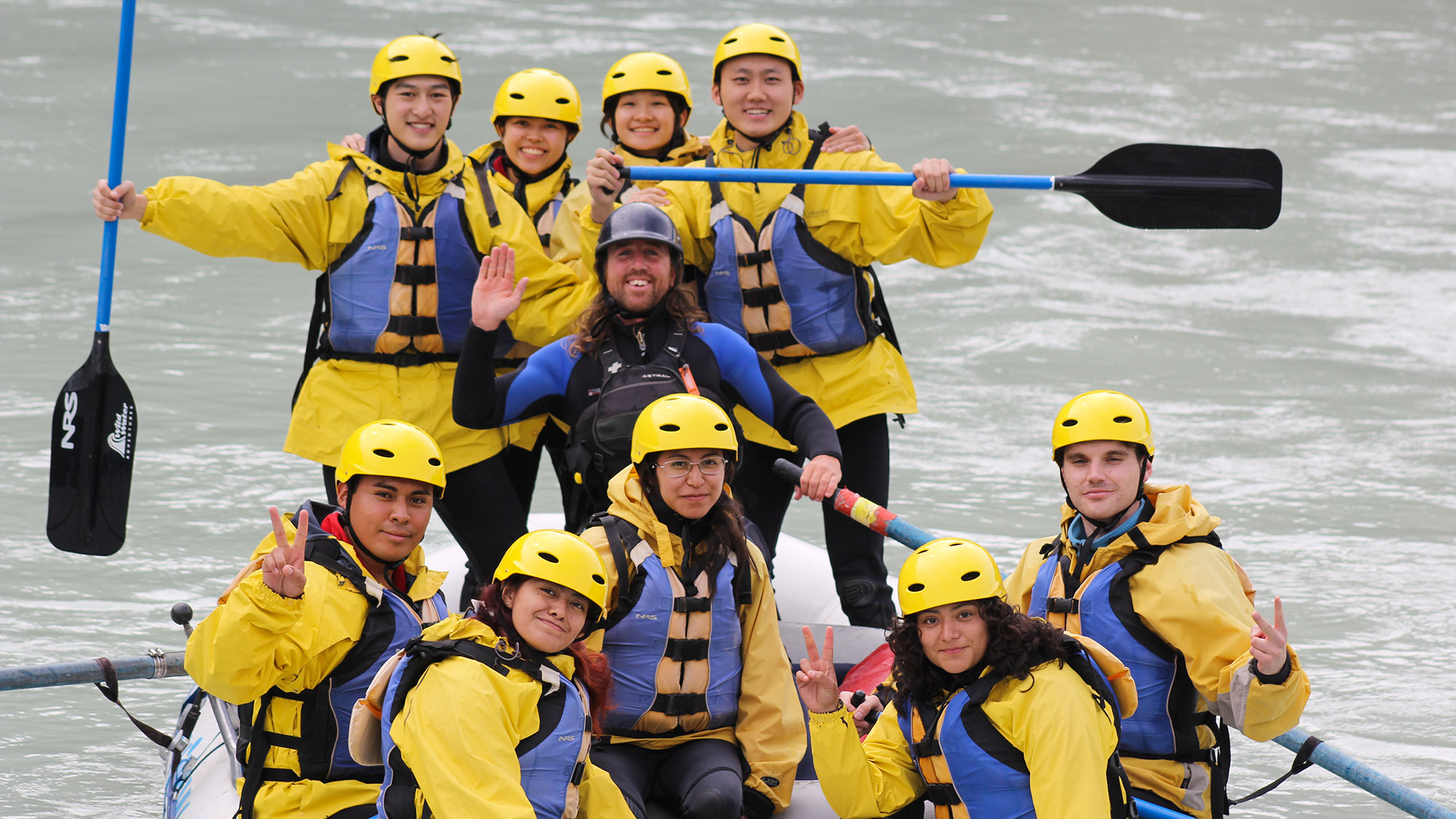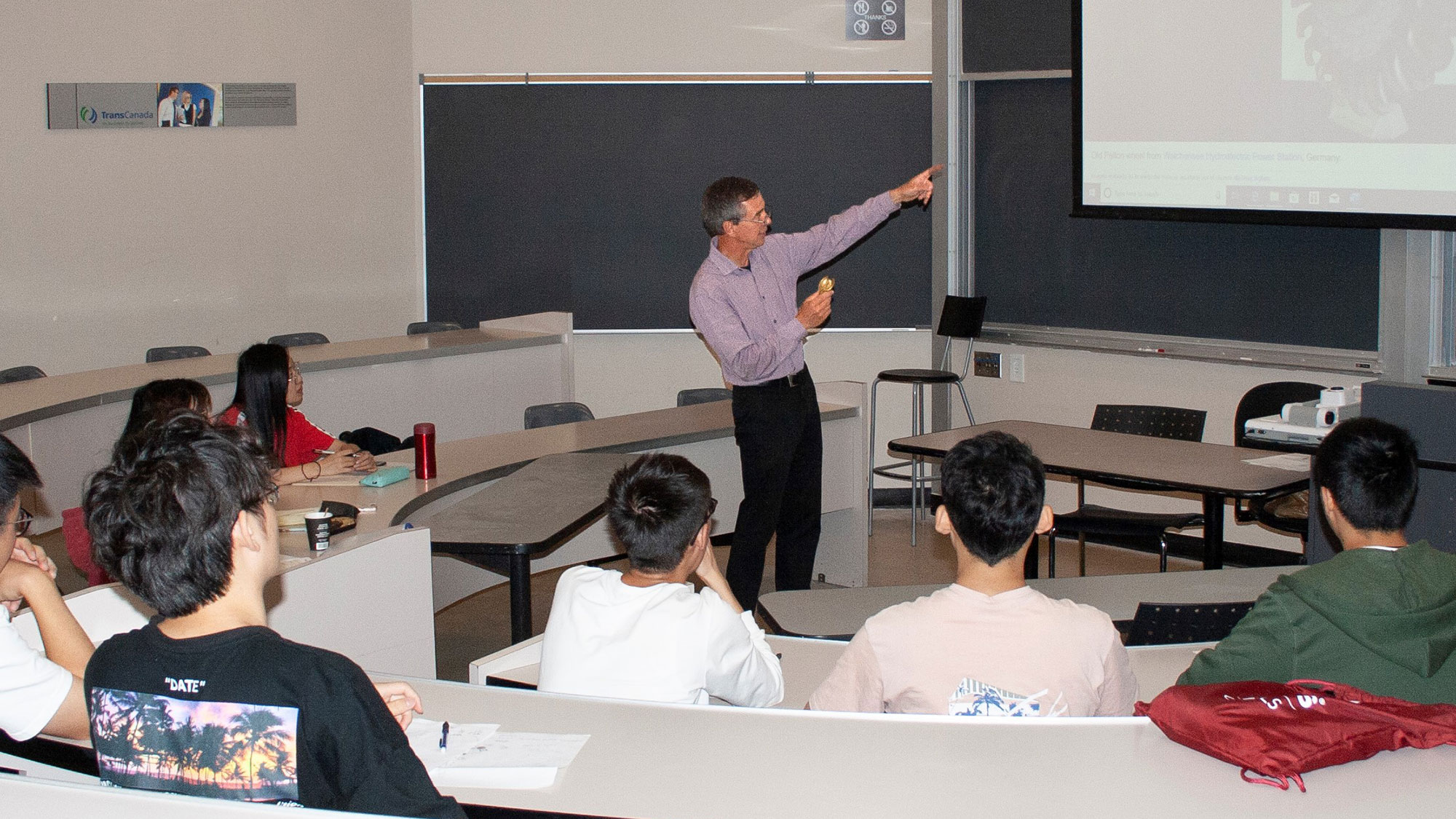Join us this summer...
Experience academic learning at one of Canada's top five research institutions. The Calgary International Summer Program is a 4-week program for international students interested in visiting Canada during the summer session.
There are two program formats to choose from:
- ESL + One Academic Course
- Two Academic Courses
Academic courses are taught by University of Calgary faculties, and English training courses are taught by English language specialists from University of Calgary Continuing Education.
In these intensive programs, students will improve their English language skills, gain international academic experience, learn Canadian culture first-hand, and visit top destinations in and around Calgary.
Courses are graded and include a certificate of participation.
ESL + One Academic Course
Students are immersed in the University of Calgary campus environment while taking an English training course from Continuing Education, and one academic course taught by a University of Calgary faculty.
Two Academic Courses
Students are immersed in the University of Calgary campus environment while taking two academic courses taught by a UCalgary faculty.
Dates and Fees
Optional trips to the Canadian Rockies are available for purchase.
July 2 – 26, 2024
Accommodation available: July 1 – 27
Application Fee: $200
Tuition for ESL + One Academic Course: $4,150 ($500 deposit)
Tuition for Two Academic Courses: $5,100 ($500 deposit)
Courses and Descriptions
Introduction to Energy and the Environment
History of energy technologies; energetics of natural systems and agriculture; formation, extraction and transformations of fossil fuels, renewables such as biomass, solar and wind; and the electricity system, environmental impacts of energy systems, and technical options for transforming energy systems to reduce environmental impacts.
Project Engineering
The project lifecycle. Project planning, scheduling, and control. Resource considerations. Cost estimating, planning, and performance. Project risk. Project personnel and organizational structures.
Pipeline Design
Function and types of pipeline systems; gathering, transmission, distribution. Design parameters and procedures: supply and demand considerations; design life; capacity planning; system planning and facilities. Hydraulic design. Mechanical design. Geotechnical design.
Pipeline Economics
Macroeconomics of system supply and demand, open season procedures, optimized sizing, J curves; CAPEX, OPEX, taxation, leasing, depreciation and capital cost allowance, developing revenue requirement, cost of service. Salvage and end of life cost. For utilities Allowance for Funds Used During Construction (AFUDC).
Fundamentals of GPS
Inertial sensors and their application in inertial navigation, existing inertial systems, new developments in strapdown technology. Practical aspects of inertial positioning definition of an operational inertial frame, inertial error models. Effect of inertial sensor errors on the derived navigation parameters, performance characteristics of inertial sensors, calibration of inertial sensors. Mechanization equations in different co-ordinate frames, step by step computation of the navigation parameters from the inertial sensor data introduction to Kalman filtering for optimal error estimation, modelling INS errors by linear state equations, practical issues for the implementation of update measurements (ZUPT, CUPT, Integrated systems), current research activities.
Power Systems
Energy transfer in power systems; real and reactive power flows; VAR compensation. Power system control, interconnected operation. Power system stability, techniques of numerical integration. Load representation, power quality. Computational paradigms for typical power system problems. Computer simulation of representative power system problems.
Project Management
Application of management principles to the project environment; planning, control, scope, time and cost processes; project organization and human resource issues. Students review aspects of a current major capital project and submit and defend a project report.
Reservoir Engineering
Formulation and solution of reservoir-engineering problems including combination of variables, Laplace transform, approximate Integral methods, and solution methods of moving boundary problems. Examples from thermal processes (e.g. hot waterflooding, SAGD), different recovery mechanisms (e.g. imbibition, expansion drive, solution-gas drive), well testing problems and naturally fractured reservoirs.
Canadian Nursing Context and Practice
This course explains the concepts foundational to the profession and discipline of nursing in Canada. The course emphasizes the social commitments and contributions of nursing within nurses' professional scope of practice. The course explores complexity and transition, social justice, and ethics of care. The course includes a comprehensive overview of the Canadian health care system.
Community and Population Health
In this course, determinants of health, health indices, principles and methods of epidemiology, and population- based health management are emphasized. Conduct of health surveys and use of population-based health data to identify health risk are addressed. Concepts of microbiology and risk elevation related to ages and stages of the lifespan are integrated. Basic tenets of evidence-informed practice will be introduced.
Nurses and Families
This course will provide an overview of the concept of family and family systems theory in relation to the role of nurses and the health of families. The Calgary Family Assessment Model is used as a framework for assessing families in a variety of practice settings and across the lifespan. It emphasizes the stages of a working with families and the fundamental skills required to develop therapeutic nurse-family relationships.
Language Teaching Methods
In this course, students are introduced to English as an Additional Language (EAL) teaching methodologies. Students will examine teaching methods vis-à-vis specific language skills (i.e., reading, writing, listening and speaking), to make connections between language learning theories and language skills development. The course considers methods in a variety of contexts and their relation to students learning in these contexts.
Research Methodology in Education
This course focuses on various issues, methods, and techniques in educational research. Including some of the issues and dilemmas that frame the context for contemporary research, as well as a preliminary consideration of research strategies, methods, and techniques in a manner intended to assist participants in selecting research questions, methods, and strategies for further study. Students will also be encouraged to approach research articles and reports with a critical perspective.
Geographies of Canada
Exploration of what it means to be Canadian in a global context. Examination of the historic, cultural, social, political, economic, and environmental factors that promote unity and inter-regional tensions.
Introduction to Indigenous Studies
A multi-disciplinary, theoretical and empirical overview of the situations, perspectives, and aspirations of selected Indigenous peoples with a focus on the Canadian context.
How to Register
Group Students: Please contact the international office at your home university to apply and register for this program. Confirm that you will receive credit for these academic courses in your home university degree program.
Individual Students: See our step-by-step registration guide.
Before registering, please read our International Refunds and Transfers policy.
Admission Requirements
- Must be 18 years of age or older
- Must be confident learning in an English classroom at the undergraduate level
- Must meet UCalgary Continuing Education's English language proficiency requirements
- Must have taken minimum one year of degree program training in their chosen discipline
Course Credit
The University of Calgary does not grant credit for these programs.
Tuition includes
- Textbooks and other learning materials
- Use of UCalgary library and sports facilities
- Shared on-campus accommodation
- Socio-cultural activities
- Emergency health insurance

